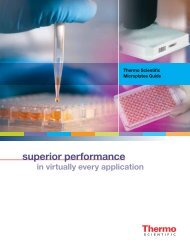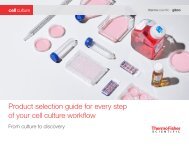PeloBiotech
Create successful ePaper yourself
Turn your PDF publications into a flip-book with our unique Google optimized e-Paper software.
www.pelobiotech.com<br />
Adult Stem Cells<br />
Adult stem cells, also known as somatic or multipotent stem cells, are a unique class of undifferentiated cells found within<br />
various tissues and organs of the human body. Unlike embryonic stem cells, which can differentiate into any cell type,<br />
adult stem cells are more restricted in their potential but still possess the ability to develop into a range of specialized cell<br />
types within the specific tissue or organ where they reside as shown in the figure above. However, these cells play a vital<br />
role in tissue maintenance. As you can see in the figure they form cells that repair, and aid in regeneration throughout an<br />
individual's life, making them a valuable resource for regenerative medicine and research aimed at understanding and<br />
treating various medical conditions. We offer the following cells:<br />
• Hematopoietic CD34+ stem cells and Mononuclear cells to isolate CD34 or CD113 cells<br />
• Available from both males and females, complete with donor clinical status.<br />
• Sourced from peripheral blood, cord blood and bone marrow.<br />
CD34 is a crucial marker for various progenitor cells, particularly hematopoietic stem cells (HSC) and hematopoietic<br />
progenitor cells (Sidney et al., 2014). It plays a significant role in hematopoiesis, as evidenced by its presence in progenitor<br />
cells during hematopoiesis, and its potential to give rise to hematopoietic, endothelial cells, and smooth muscle cells<br />
(Kapoor et al., 2019; Bai et al., 2009). CD34 has been linked to cellular homing patterns to the bone marrow and adhesion<br />
of cells to stromal microenvironments or sites of inflammation (Kopher et al., 2010). Furthermore, CD34(+) stem cells<br />
have been found to play an important role during liver development and regeneration (Park et al., 2015). Additionally,<br />
CD34 has been associated with the regulation and compartmentalization of stem cells, promoting their adhesive<br />
interactions with the stromal microenvironment of the bone marrow (Healy et al., 1995). It has also been identified as a<br />
marker for hematopoietic stem cells and non-hematopoietic progenitors, including vascular endothelial progenitors and<br />
embryonic fibroblasts, multipotent mesenchymal stromal cells, interstitial dendritic cells, and epithelial progenitors<br />
(Soliman, 2021). Moreover, CD34 has been utilized as an important marker for labeling hematopoietic stem cells,<br />
demonstrating its significance in stem cell research and applications (Ye et al., 2004).<br />
Mesenchymal/Stromal Stem cells<br />
Mesenchymal stromal cells (MSCs), often called mesenchymal stem cells, are adult stem cells found in bone marrow,<br />
adipose, Wharton jelly and other tissues. Notable characteristics include:<br />
• Differentiation into various cell types, such as bone, cartilage, and fat cells.<br />
• Immune system modulation, making them valuable for treating autoimmune diseases, inflammatory conditions,<br />
and tissue damage.<br />
• Regenerative properties that promote tissue repair.<br />
11
















